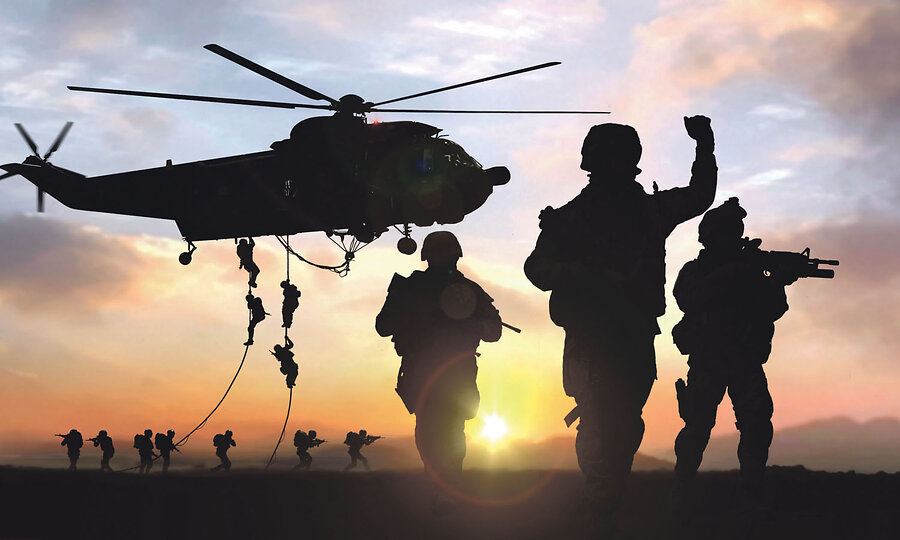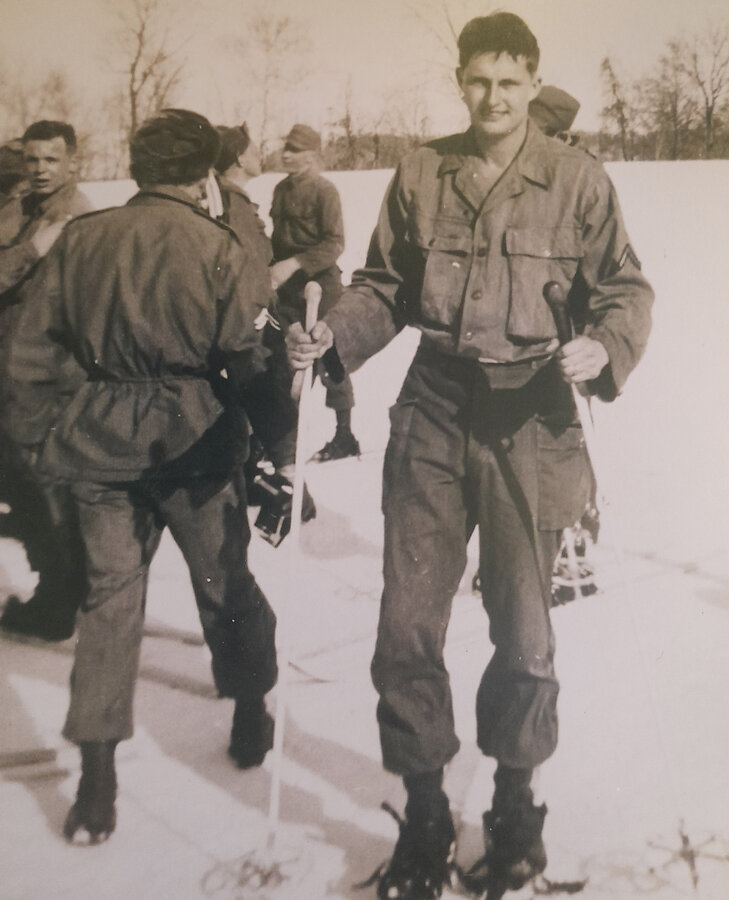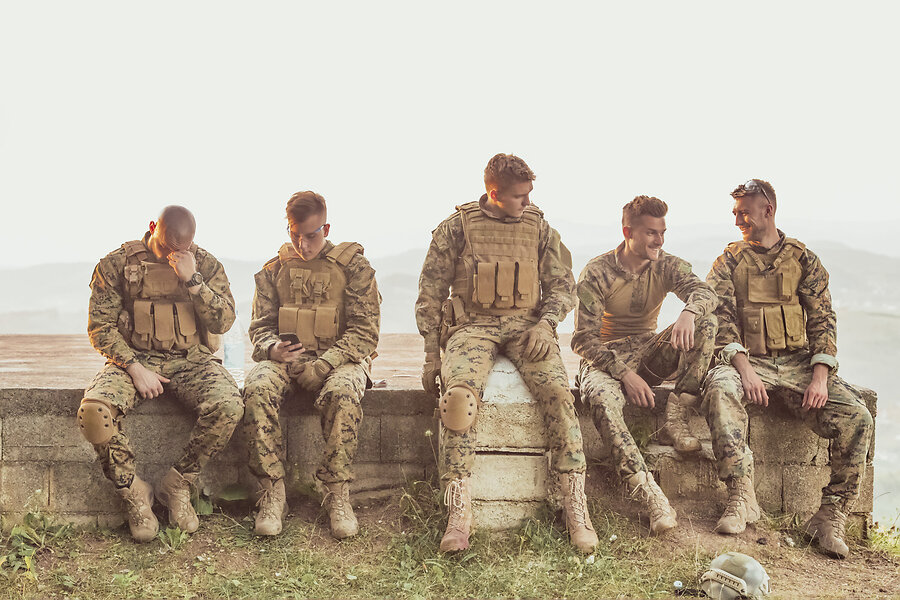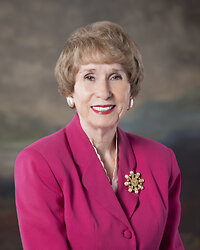"THANK YOU FOR YOUR SACRIFICE"
Personal reflections on appreciating veterans and those serving in our military
by Rob Lauer

In the early 1960s, there was a gentleman in our neighborhood with a reputation for being a "hot head." Usually affable and good-natured, it was rumored the least little thing could "set him off." When I was five, I experienced one of his temper tantrums firsthand. At a neighborhood cookout, this fellow was playing softball with other men when the ball was hit out of bounds and rolled toward me. As I hurried toward the ball to toss it back to the men, this fellow yelled, "Don't touch that ball!" But his cry came too late: the ball was already in my hand, and I was walking toward the men to give it back to them. The "hot head" ran toward me enraged, snatched the ball away, and bellowed, "I told you not to touch the ball!" I was shocked and confused, having no idea what I had done wrong when I was only trying to help. I don't remember if I cried or not. I know my mother did. She scooped me up in her arms and, with my father, quickly left the picnic. Some of the neighbors hurried after us, trying to console my mother and begging my parents not to go. But there was no reason to stay. The man's tirade had ended the cookout.
This gentleman, then in his 40s, was a World War II vet, and it was said that before being drafted, he had been an easy-going fellow who never lost his temper. Being a Generation Joneser, it seemed that most middle-aged men I grew up around had "fought in the war," but none acted like this fellow. It wasn't until he was in his 70s that he began talking to his family and friends about his wartime experiences. Everyone was shocked to learn that he was a survivor of one of World War II's most catastrophic battles. For decades, he had gone on with his life without ever speaking of the emotional toll. His unexpected temper tantrums suddenly made sense.
A few years ago, a friend told me of the tension in his home while he was growing up. His father, a World War II vet, was uncommunicative, emotionally distant, and, at times, drank too much. In 1975, when my friend saw that year's big blockbuster "Jaws," he was fascinated by one of the film's iconic scenes in which one character-a World War II vet turned shark hunter-told the story of surviving the sinking of the USS Indianapolis during the last days of the war. Hit by Japanese torpedoes, the ship sank in minutes, sending 1,196 men into the water. The sinking of the Indianapolis resulted in the most shark attacks on humans in history: when rescue ships arrived five days later, only 317 men remained alive. Intrigued, my friend hurried to the library to read the one book then available on the Indianapolis. When he perused the list of the ship's 317 survivors at the end of the book, he was stunned to see his father's name there. Suddenly, the emotional landscape at home had a context.
My uncle, Bill Opfar, was also a veteran who, for years, talked very little about his World War II experiences. According to one story circulated by family members, Uncle Bill, later in life, was angered by reports of Holocaust deniers on the evening news and began opening up. It turned out that not only had he survived the Battle of the Bulge-the bloodiest single battle fought by the U.S. in World War II and the third-deadliest campaign in American history-but he had also helped liberate a German concentration camp. Having seen firsthand the horrific suffering the Nazis had inflicted on Jewish men, women, and children, Uncle Bill couldn't stomach the lies of Holocaust deniers.
Recently, I asked my cousin, William Opfar, Jr., about this bit of family folklore. "I've never heard that one," he said. "But men of that generation didn't really talk about their wartime experiences with anyone but other veterans. I don't remember Dad talking much about the war to us while I was growing up, but years later, he started going to the local American Legion, connecting with other vets, and talking about it more."

My father did talk about his two years of service even though, ironically, he was part of the Silent Generation: those who were born during the Great Depression, were adolescents during World War II but old enough to be drafted in the Korean War-nicknamed "America's Forgotten War." Dad never forgot that war.
He was drafted in 1951 and served two years. The handful of his friends who were also drafted during the Korean War served state-side, working office jobs at regional military bases that often allowed them to come home on weekends. But after basic training, Dad was shipped overseas, directly into the fighting.
On his first day in Korea, Dad and two other men were chosen to carry supplies to U.S. soldiers fighting atop a hill-all while under fire the entire time. One of them was hit and seriously wounded. My dad and the one who wasn't hit made it to the top of the hill, delivered the supplies, and returned down the hill, retrieving their wounded comrade on the way-while again under fire.
That was day one of two years, and from everything Dad said, it never got much better. He described the fighting in Korea as seeming "like the end of the world," and while living through it, he struggled to wrap his mind around the fact that, at the same time, his family and friends back home were peacefully living life as usual.
Dad recalled his company making their way through a forest while under fire. Most of the fallen soldiers they passed were already dead, but one young man was still alive, in agony and slowly bleeding to death. Being under fire, they couldn't stop to help him. Dad said he thought of that young man's mother and was grateful that when notified of her son's death, she would never have to know about the agony of his last moments.
About ten years ago, Dad told me that one of his best friends-a VMI graduate who had served as an officer state-side during the Korean War-asked him: "Bobby, when you were in Korea, did you sleep in tents at night?" My dad laughed incredulously at his friend's question. "Sleep in tents?" he said. "When we were able to sleep, we slept on the ground, wherever we could find a spot-in the mud, in the rain, in the snow. We usually didn't know where we were. It was always pitch black at night; we were out in the elements and could hear guns and explosions going off the entire time."
Dad often recalled that when he returned home in March of 1953, no one-not even his parents-asked him about his experiences in the war or made that big of a deal about his return home. "Everyone acted like I had just been away on a trip for two years, and now I was back," he said.
But the Korean War deeply affected my father. My mother said he returned from Korea a different person: more grown-up, more serious.
Dad often recalled that when he returned home in March of 1953, no one-not even his parents-asked him about his experiences in the war or made that big of a deal about his return home. "Everyone acted like I had just been away on a trip for two years, and now I was back," he said.
But the Korean War deeply affected my father. My mother said he returned from Korea a different person: more grown-up, more serious.
When contemplating how often Dad talked with me about the war during the 64 years I had with him, I realize how deeply the experience affected him. I now know that his military service was the turning point in his life.
My initial impulse is to say Dad was proud of his two years of service, but pride is the wrong word. He never bragged about serving. Rather than saying Dad was proud of his service in the Korean War, I would say he had reverence for those two years. And he reverenced the military service-the actual boots-on-the-ground, life-in-danger military service of other Americans. He empathized with them-and with their parents and loved ones back home-because from experience, he understood that no matter how just and right the cause, war itself is tragic; it is misery, suffering, and death, a breakdown of civilization and the very things that make us human.
When one has lived through such a breakdown of civilization, how does one return to civilian life? How can one communicate that experience to civilians? And how can civilians honestly appreciate that experience when they have only lived a life governed by civility?

My friend Phillip May is a veteran and physical therapist who served in the Medical Service Corps and was wounded during the last of two deployments to the Middle East. I ask him about the challenges combat vets face reassimilating into civilian society. "It's different for everyone," he replies. "Two people can go through the same experience; one will be fine, and the other will have PTSD."
I ask if he has any tips on what to say, not say, or remember when interacting with a combat vet.
"You don't want to get too personal," Philip says. "If they've been wounded, don't enquire about their injuries. No one wants to play '20 Questions' about the most traumatic event in their life. Maybe you can ask them what they enjoyed about their service. There are so many things about military life that are great."
"You don't want to get too personal," Philip says. "If they've been wounded, don't enquire about their injuries. No one wants to play '20 Questions' about the most traumatic event in their life. Maybe you can ask them what they enjoyed about their service. There are so many things about military life that are great."
"Avoid stereotyping service people," he continues. "Don't make assumptions about their politics. Patriots serving in the military are Liberal, Conservative, Moderate, Left Wing, Right Wing, Republican, and Democrat."
"Remember that military service puts a lot of wear and tear on the body," Philips points out. "People can now retire after serving 20 years, regardless of age, so there are a lot of 'young' military retirees. The aches and pains a 43-year-old military retiree deals with might seem like those a 43-year-old civilian deals with-but that's only on the surface. There's a difference between nerve leg pain from diabetes or the natural aging process as opposed to having been hit with shrapnel. Car accident injuries are traumatic, but they're not combat injuries; the context is different. Someone wounded in combat also deals with the emotional trauma of the event-which never completely goes away. Keep in mind that a wounded vet who is doing well and seems to have it all together when you're around him is still dealing with trauma privately, and it takes a lot of energy on a daily basis to do that.
"Finally, appreciate service in all divisions of the military," Philip insists. "No division is safer than any other. Serving in any of them means committing yourself to laying down your life if needed."
I ask Philip how he feels when someone says, "Thank you for your service"-a phrase that here in Hampton Roads is as common as "Hello" or "Have a good day."
I ask Philip how he feels when someone says, "Thank you for your service"-a phrase that here in Hampton Roads is as common as "Hello" or "Have a good day."
"I'm glad people say it, but it tends to feel a little meaningless when it's said so automatically," he says. "I wish people truly understood the sacrifices made by vets and service people. Everyone in society is needed, and some, like the police and firefighters, put themselves in danger for society's sake. But going into a burning building or an active crime scene is a different kind of danger than going into combat. And people in other professions usually go home after work and sleep in their own beds. When it comes to military service, acknowledge the deployments. Those months away come at great personal costs not only to those serving but to their families and their marriages. And when they've completed their service, some will have to deal with injuries or trauma for the rest of their lives. And everyone deals with the challenges of reentering civilian life."
When I ask Phillip how we can better show our appreciation to vets and those serving, he pauses.
"Really acknowledge that military service is sacrifice," he finally replies. "Maybe instead of saying
"Really acknowledge that military service is sacrifice," he finally replies. "Maybe instead of saying
'Thank you for your service,' people could say, 'Thank you for your sacrifice.'"
The Shopper
1545 Crossways Blvd.
Chesapeake, VA 23320
757-317-5465
http://www.TheShopper.com
CURRENT COLUMNS
Children First 
THE IMPACT OF GRADUATION by Becky AdamsOn The Front Porch With You 
Hating the Paint on Your Neighbor's Houseby Rob LauerRelationships 
A Big Thank You!by Dr. Bill Austin
